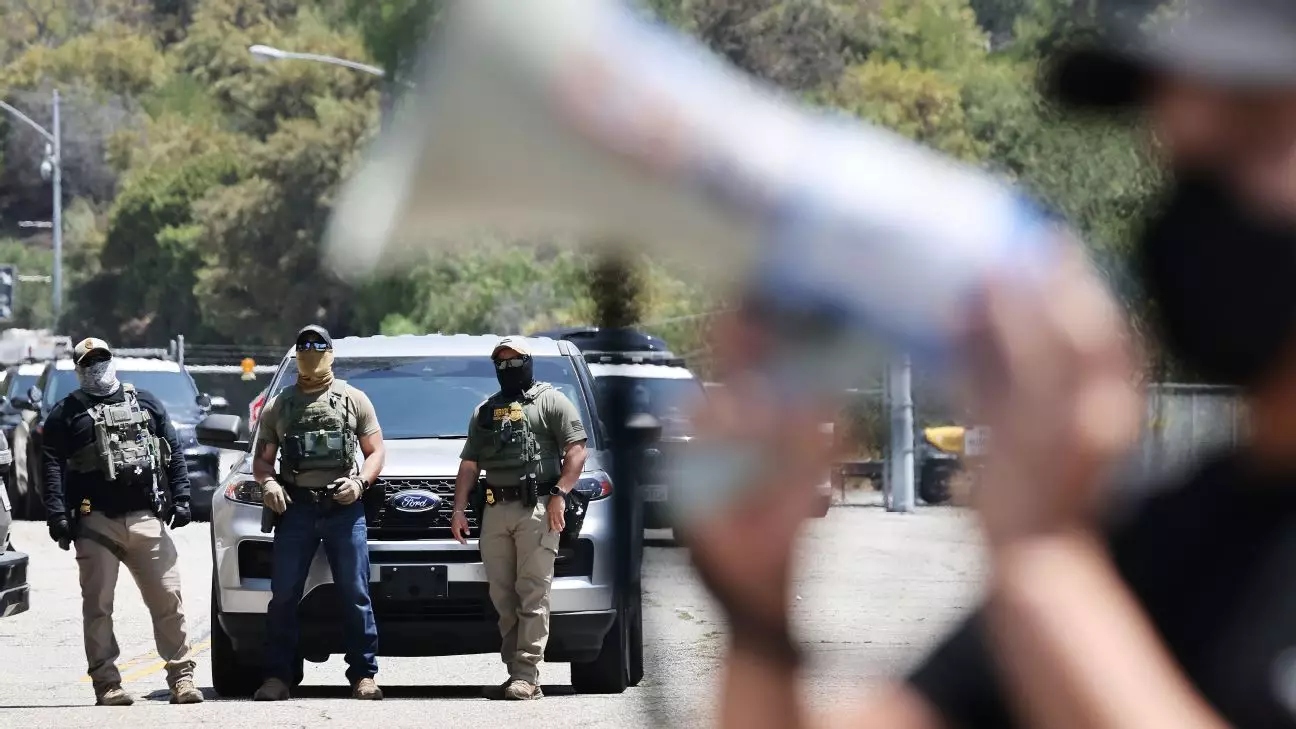On an ordinary Thursday morning, Dodger Stadium transformed into an unexpected battleground, where the clash of federal immigration enforcement and community resistance came to a head. As agents from the Department of Homeland Security attempted to set foot on the stadium grounds, the Los Angeles Dodgers found themselves in a precarious position—Caught between the demands for legal compliance and their moral obligation to support local immigrant communities. The alarm sparked across social media as images of unmarked vans and federal agents circulated, instigating renewed protests against immigration enforcement. The presence of these agents at a beloved sports venue was not just a trivial incident; it was a manifestation of a broader national struggle over immigration policies and community safety.
The Dodgers’ Moral Quandary
Faced with federal agents declaring their intent to process detainees at Dodger Stadium, the Dodgers organization made the courageous decision to deny access to these officials, firmly asserting that their home is private property. However, it was not just a logistical maneuver; it symbolized a moral stand against federal policies that have polarized local communities. In the aftermath, Dodgers’ President Stan Kasten announced a delay in the unveiling of new community initiatives, reflecting a shrewd pragmatism. The idea was not just to postpone their announcement but to reassess amidst a growing climate of unrest. This postponement prompted criticism from various corners, arguing that the organization should have been more proactive in openly supporting immigrants.
A Community in Upheaval
The scene outside of Dodger Stadium was electric, tinged with anger and anxiety as local protesters gathered outside the gates. These individuals, driven by personal experiences and a shared sense of justice, were unapologetically vocal about their disdain for immigration enforcement tactics. They had witnessed firsthand the impact of recent ICE raids that swept through Los Angeles neighborhoods, affecting lives and livelihoods. Protesting isn’t merely a reaction; it’s a plea for acknowledgment. With citizens blocking freeways and taking to the streets, a boiling point of frustration was reached, showcasing a community exasperated by federal incursions into their lives.
A Divided Response from Authorities
The federal response to the gathering was swift and fueled by a sense of obligation to uphold the law. However, the presence of the Los Angeles Police Department, while aimed at maintaining order, disbanded the protest only after it reached a fever pitch. The very relocation of federal agents—from Gate A to Gate E—highlights the clear reluctance from local authorities to allow the enforcement of policies viewed as unjust or misaligned with community values. Notably, the conflicting narratives from federal agencies—where ICE denied its involvement while the Department of Homeland Security clarified the role of U.S. Customs and Border Patrol—exemplified the chaotic nature of immigration enforcement, leaving citizens in a state of confusion and distrust.
The Broader Impact of Federal Policies
These events in Los Angeles serve as more than just a localized instance of protest. They reflect a national trajectory where federal immigration policies are increasingly scrutinized and resisted by communities. This tension has not been confined to high-profile incidents; it permeates everyday life, with reports of ICE presence infiltrating seemingly mundane spaces—libraries, car washes, and home improvement stores. The fallout from such encounters is profound, resulting in an atmosphere of suspicion and fear. Families live in dread of deportation, and community bonds are tested as neighbors turn against each other under the pressure of federal oversight.
The Dodgers’ Responsibility to the Community
As the Dodgers grapple with their identity as a sports franchise versus their role in the community, the initial plans to collaborate with immigrant advocacy groups represent a significant opportunity for reconciliation and solidarity. Fans and stakeholders expect more than just ballgames; they seek organizations that can navigate the complexities of social justice. The decision to postpone their announcement could be perceived as a retreat, but it could also represent a moment for reflection and recalibration. In a world where sports often intersect with societal issues, the Dodgers have a unique platform to advocate for change and address the elephant in the room—federal immigration enforcement.
In this tumultuous environment, the choice lies before them: to stand in silence or to use their influence to champion a cause that seeks to elevate humanity amidst the harsh realities of immigration policies. The forthcoming actions of this storied franchise may not just impact baseball fans, but they could send ripples of hope and support to the very communities that have embraced them as their own.

